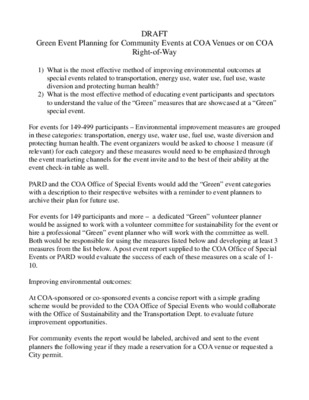Green Event Planning — original pdf
Backup

DRAFT Green Event Planning for Community Events at COA Venues or on COA Right-of-Way 1) What is the most effective method of improving environmental outcomes at special events related to transportation, energy use, water use, fuel use, waste diversion and protecting human health? 2) What is the most effective method of educating event participants and spectators to understand the value of the “Green” measures that are showcased at a “Green” special event. For events for 149-499 participants – Environmental improvement measures are grouped in these categories: transportation, energy use, water use, fuel use, waste diversion and protecting human health. The event organizers would be asked to choose 1 measure (if relevant) for each category and these measures would need to be emphasized through the event marketing channels for the event invite and to the best of their ability at the event check-in table as well. PARD and the COA Office of Special Events would add the “Green” event categories with a description to their respective websites with a reminder to event planners to archive their plan for future use. For events for 149 participants and more – a dedicated “Green” volunteer planner would be assigned to work with a volunteer committee for sustainability for the event or hire a professional “Green” event planner who will work with the committee as well. Both would be responsible for using the measures listed below and developing at least 3 measures from the list below. A post event report supplied to the COA Office of Special Events or PARD would evaluate the success of each of these measures on a scale of 1-10. Improving environmental outcomes: At COA-sponsored or co-sponsored events a concise report with a simple grading scheme would be provided to the COA Office of Special Events who would collaborate with the Office of Sustainability and the Transportation Dept. to evaluate future improvement opportunities. For community events the report would be labeled, archived and sent to the event planners the following year if they made a reservation for a COA venue or requested a City permit. Recommended measure options for “greening” special events on COA parkland Incorporate Zero Waste Guidelines into your event: http://www.austintexas.gov/sites/default/files/files/Resource_Recovery/Event_Recycling_GUidelines_1.7.16_.pdf Use the Event Recyling Rebate offered by Austin Resource Recovery https://www.austintexas.gov/page/event-recycling-rebate Use a Water Monster or similar in place of bottled water paired with compostable cups. Encourage attendees to bring their own reusable water bottles Make attendees aware of available bus routes near the special event and plan for bicycle parking by using existing bike racks/bike corrals or bringing portable bike racks to the site with a bike valet option. Bike parking is already part of the COA Special Events Ordinance. Compliance with this provision is uncertain. Use non-petroluem based lighter fluid such as Eco Start and natural wood briquets to reduce air pollution Use food caterers who can source locally-produced, single portion snacks or meals with at least one vegetarian option with reyclable or compostable packaging. Alternative: offer a buffet style meal with resusable plates, silverware and glasses/cups Only use electric golf carts, utility carts and generators Have a styrofoam-free and single-use cup free event Limit the distribution of single-use promotional items that have little or no perceived value. If promotional items are used then they should be recyclable, compostable or easily reusable. Create reusable event signs/banners along with e-invitations and e-thank you messages to attendees/donors. Use new media along with TV/Radio outreach to eliminate single-use posters adhered to buildings and telephone polls. Adhere to Parks and Recreation guidelines that prohibit vehicle parking on parkland to help protect tree roots, soil and water quality. Encourage carpooling. Use a solar-powered stage if music is part of the event. Enforce a strict idling policy of 1 minute or less for diesel-powered and gas-powered vehicles